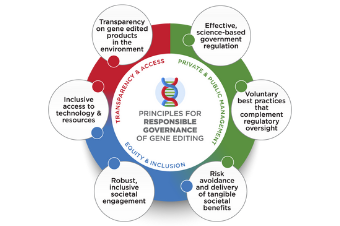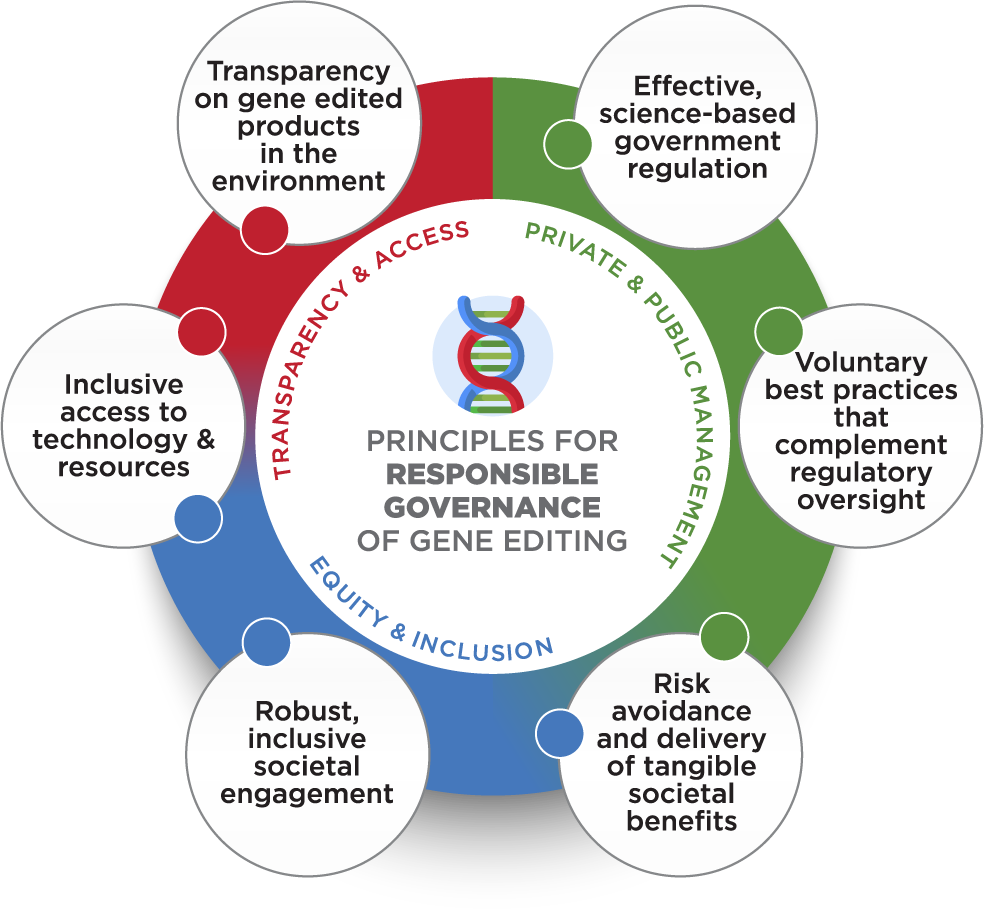Representatives of conservation and consumer non-governmental organizations unveiled six principles for responsible governance of gene editing in agriculture and the environment in an article published today by Nature Biotechnology. The authors noted that gene editing and other biotechnologies have the potential to address urgent food security, environmental, and human health dilemmas, yet these technologies also raise potential for societal concerns, environmental and health risks, and conflicts with cultural and spiritual values.
“To the extent that these products are being, and will continue to be, developed and applied in agriculture and the environment, we must consider how this activity occurs and under whose management, oversight, and stewardship,” wrote the authors in the article.
The six principles outlined in the article include: 1) Effective, science-based government regulation; 2) Voluntary best practices that complement regulatory oversight; 3) Risk avoidance and delivery of tangible societal benefits; 4) Robust, inclusive societal engagement; 5) Inclusive access to technology & resources; and 6) Transparency on gene editing products in the environment.
“Our principles could apply to products produced with almost any technology,” wrote the authors, noting that gene-editing techniques are not independent of the broader social, ecological, and economic histories, contexts, and debates related to earlier genetic engineering technologies. “We have focused on genetic editing because: this methodology has potential for safe and beneficial applications; new products are being developed rapidly; regulation and introduction of new products into commerce is controversial; and the lack of appropriate governance could lead to unintended environmental consequences or severely limit its use.”
The principles—developed by representatives from Center for Science in the Public Interest, Consumer Federation of America, Environmental Defense Fund, National Wildlife Federation, The Nature Conservancy, and World Wildlife Fund U.S.—are intended to provide a high-level framework for responsible innovation and governance of gene-editing technologies.
“We offer governance principles as a starting point and roadmap for collaboration among many sectors — scientists, product developers, policymakers, regulators, companies, civil society, and consumers — that jointly could develop a pathway to the responsible innovation, governance, and deployment of gene editing technology,” the authors wrote. “They are an invitation from our organizations to other stakeholders to join us in developing a governance framework for gene editing at a critical time for this technology.”
The principles focus on gene-editing governance in the public and private sectors in the US context, recognizing governance in the United States can influence outcomes elsewhere. Underscoring the timeliness of discussion of principles for gene editing and the inadequacy of the current governance and regulatory framework, the organizations note that several developers are currently poised to introduce gene-edited products into commerce and that the U.S. Department of Agriculture recently substantially deregulated gene-edited plants and proposed a similarly minimal oversight system for gene-edited animals.
The six non-governmental organizations are participants in the NGO Roundtable on Potential Implications of Gene Editing Applications for Agriculture and the Environment. The roundtable is facilitated by the Keystone Policy Center and brings together US-based NGOs in food, agriculture, the environment and related interest areas to provide a forum for peer-to-peer engagement on gene editing policy and science and exploration of gene editing’s potential impacts in agriculture and the environment.
The article in Nature Biotechnology is available here.
Additional information is available here.



 Effective March 1, 2025, Thomas J. Vilsack, former United States Secretary of Agriculture and Governor of Iowa, became the first Chief Executive Officer for the World Food Prize Foundation. In this new role, Governor Vilsack is focusing on expanding the Foundation’s global network, and will further position the Foundation as a leader in addressing global food and nutrition insecurity, continuing his lifetime of public service.
Effective March 1, 2025, Thomas J. Vilsack, former United States Secretary of Agriculture and Governor of Iowa, became the first Chief Executive Officer for the World Food Prize Foundation. In this new role, Governor Vilsack is focusing on expanding the Foundation’s global network, and will further position the Foundation as a leader in addressing global food and nutrition insecurity, continuing his lifetime of public service. Shelby Coffey III is a distinguished journalist, media executive, and thought leader whose career has helped shape the landscape of American news and public discourse. Over several decades, Coffey has held some of the most influential roles in journalism, including serving as editor of the Los Angeles Times, executive vice president of ABC News, and deputy managing editor of The Washington Post. His editorial leadership extended to key roles as president of CNN Financial News, editor of the Dallas Times Herald, and U.S. News & World Report.
Shelby Coffey III is a distinguished journalist, media executive, and thought leader whose career has helped shape the landscape of American news and public discourse. Over several decades, Coffey has held some of the most influential roles in journalism, including serving as editor of the Los Angeles Times, executive vice president of ABC News, and deputy managing editor of The Washington Post. His editorial leadership extended to key roles as president of CNN Financial News, editor of the Dallas Times Herald, and U.S. News & World Report. Jerry Steiner has spent 40 years involved in agriculture following growing up on a Wisconsin dairy farm. He began his career with Monsanto, in multiple business leadership roles. From 2003-2013 he served as a member of the Executive team, as the company’s Executive Vice President of Sustainability and Corporate Affairs. He led the company’s global Government, Public and Industry Affairs teams across the 70 countries where Monsanto conducts business. This experience got Jerry connected to the Keystones centers work in agriculture. Key among his responsibilities were shaping the company’s public policy and building partnerships aimed at helping farmers around the world produce more food, while conserving valuable resources like water and energy. Two unique partnership that developed under his leadership were drought tolerant corn with 5 African countries, CIMMYT and the Gates foundation, and a building a sustainable business model in Brazil with the value chain leading to significant multi-company investment and soybean varieties that can protected themselves.
Jerry Steiner has spent 40 years involved in agriculture following growing up on a Wisconsin dairy farm. He began his career with Monsanto, in multiple business leadership roles. From 2003-2013 he served as a member of the Executive team, as the company’s Executive Vice President of Sustainability and Corporate Affairs. He led the company’s global Government, Public and Industry Affairs teams across the 70 countries where Monsanto conducts business. This experience got Jerry connected to the Keystones centers work in agriculture. Key among his responsibilities were shaping the company’s public policy and building partnerships aimed at helping farmers around the world produce more food, while conserving valuable resources like water and energy. Two unique partnership that developed under his leadership were drought tolerant corn with 5 African countries, CIMMYT and the Gates foundation, and a building a sustainable business model in Brazil with the value chain leading to significant multi-company investment and soybean varieties that can protected themselves. Jennifer Morris is the Chief Executive Officer of The Nature Conservancy, leading a team of nearly 6,000 staff working in more than 80 countries and territories tackling the dual crises of the
Jennifer Morris is the Chief Executive Officer of The Nature Conservancy, leading a team of nearly 6,000 staff working in more than 80 countries and territories tackling the dual crises of the  Congressman Joe Neguse represents Colorado’s 2nd District in the U.S. House of Representatives. He was elected to his first term in November 2018, becoming the first Black Member of Congress in Colorado history. In December 2022, Rep. Neguse was elected by his colleagues to serve as Chair of the Democratic Policy and Communications Committee (DPCC), becoming the first Coloradan to serve in a senior elected leadership role in the House in over 85 years. He serves on the Natural Resources and Judiciary Committees, and was also appointed by House Minority Leader Hakeem Jeffries to serve as one of four Democrats on the prestigious Rules Committee. Rep. Neguse serves as Ranking Member on the House Subcommittee on Federal Lands, which he previously Chaired in the 117th Congress.
Congressman Joe Neguse represents Colorado’s 2nd District in the U.S. House of Representatives. He was elected to his first term in November 2018, becoming the first Black Member of Congress in Colorado history. In December 2022, Rep. Neguse was elected by his colleagues to serve as Chair of the Democratic Policy and Communications Committee (DPCC), becoming the first Coloradan to serve in a senior elected leadership role in the House in over 85 years. He serves on the Natural Resources and Judiciary Committees, and was also appointed by House Minority Leader Hakeem Jeffries to serve as one of four Democrats on the prestigious Rules Committee. Rep. Neguse serves as Ranking Member on the House Subcommittee on Federal Lands, which he previously Chaired in the 117th Congress. Llewellyn King was born in Southern Rhodesia, now Zimbabwe. He went into journalism as soon as he turned 16, stringing for Time magazine and United Press in Africa.
Llewellyn King was born in Southern Rhodesia, now Zimbabwe. He went into journalism as soon as he turned 16, stringing for Time magazine and United Press in Africa. Steven Williams is the Chief Executive Officer of PepsiCo North America, overseeing a more than $48 billion business that spans PepsiCo’s Foods and Beverage operating units. His leadership encompasses more than 125,000 associates and over 900 locations across the U.S. and Canada. Steven joined PepsiCo in 2001 as part of PepsiCo’s acquisition of the Quaker Oats Company, which he joined in 1997, and has held leadership positions of increased responsibility since.
Steven Williams is the Chief Executive Officer of PepsiCo North America, overseeing a more than $48 billion business that spans PepsiCo’s Foods and Beverage operating units. His leadership encompasses more than 125,000 associates and over 900 locations across the U.S. and Canada. Steven joined PepsiCo in 2001 as part of PepsiCo’s acquisition of the Quaker Oats Company, which he joined in 1997, and has held leadership positions of increased responsibility since.